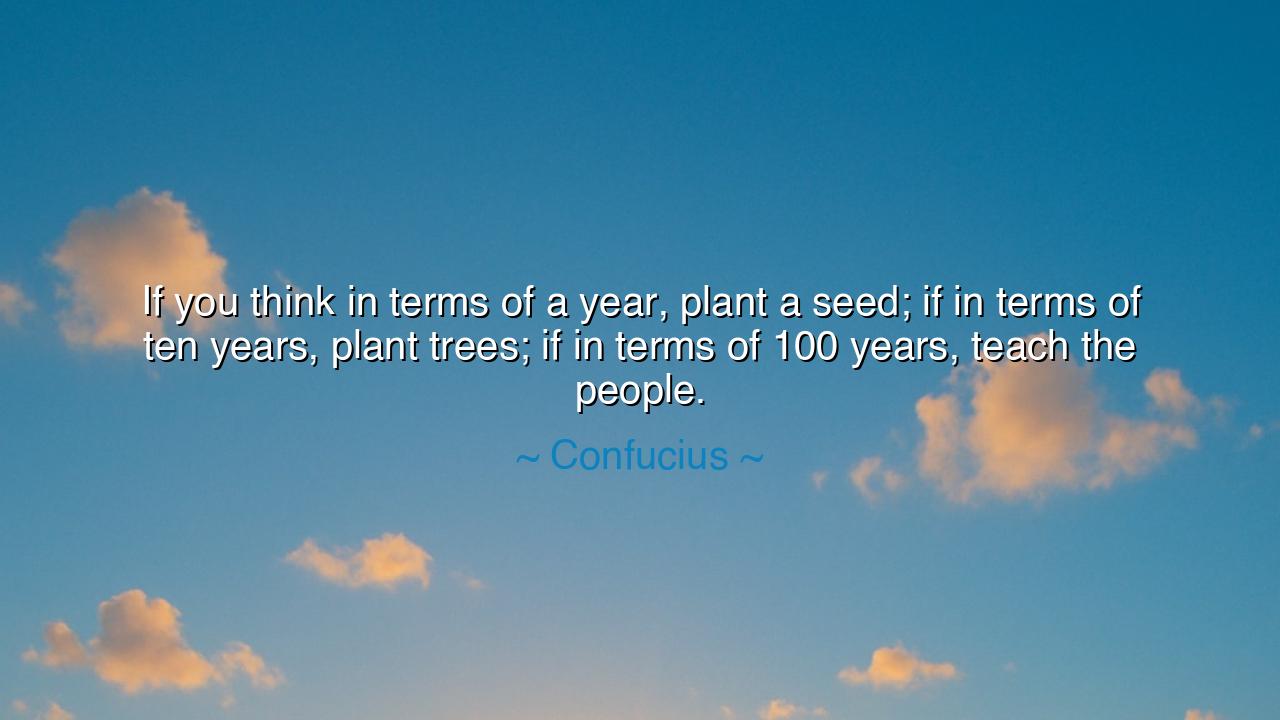
If you think in terms of a year, plant a seed; if in terms of ten
If you think in terms of a year, plant a seed; if in terms of ten years, plant trees; if in terms of 100 years, teach the people.






In the great tapestry of life, where time weaves its intricate threads across the generations, Confucius speaks to us from the depths of ancient wisdom: "If you think in terms of a year, plant a seed; if in terms of ten years, plant trees; if in terms of 100 years, teach the people." This profound teaching reveals the transformative power of long-term thinking and the importance of sowing the seeds of wisdom and growth that extend far beyond our own lifetimes. The act of planting a seed is symbolic of small, short-term actions that yield quick results, while planting trees represents the need to nurture long-term growth. However, the act of teaching is the highest form of planting—a legacy that stretches across centuries. To teach is to sow not just for one generation, but for the enduring future of humanity.
In the age of Confucius, wisdom was passed through generations, not in the mere passing of knowledge but in the cultivation of minds. He understood that to change the world, we must not merely think of the present moment but act with a vision for the future. His teachings were not just for his immediate disciples but were intended to shape the minds and hearts of generations to come. Like a farmer who carefully chooses where to plant seeds, Confucius recognized that the work we do today will bear fruit in ways that are often unseen. The seeds we plant are not merely for our own harvest, but for those who come after us, in the forests of wisdom and virtue that we leave behind.
The ancient Greeks too, understood the power of long-term vision. Socrates, the great philosopher, often spoke of the importance of shaping the minds of the youth, believing that the future of society rested in the education of the young. Socrates knew that changing the world required not just individual actions, but a shift in the way people thought—and this could only be achieved by teaching future generations to seek truth, justice, and virtue. Much like Confucius, Socrates emphasized that true change requires patience, for it is not the immediate outcome that matters, but the legacy of wisdom passed down through the ages. To teach was to plant the seeds of greatness for future generations.
Marcus Aurelius, the Stoic philosopher and Roman Emperor, also grasped the importance of long-term legacy. In his personal writings, Meditations, he often reflects on the transience of life, reminding himself that he, like all men, is just a small part of the grand flow of time. But unlike those who might despair over their fleeting lives, Aurelius chose to act with the knowledge that the virtue he cultivated, the lessons he imparted, and the strength he embodied would leave a lasting impact on the Roman Empire and beyond. His reflections are a testament to Confucius’s teaching—Aurelius understood that a ruler’s true power lies not in his control over the present, but in his ability to shape the future through his actions and his teaching.
Consider the example of Abraham Lincoln, whose legacy was not just in the laws he enacted but in the principles he instilled in the nation. Lincoln’s belief in freedom and equality was not just an aspiration for his time, but a vision that transcended his presidency. By leading the nation through its greatest crisis, the Civil War, and making strides toward the abolition of slavery, he planted the seeds of future progress. But Lincoln’s greatest contribution was his ability to teach future generations about the ideals of justice and unity—principles that would continue to shape the nation long after his death. Like Confucius, Lincoln’s work was not for immediate glory, but for the enduring good of generations yet unborn.
The lesson in Confucius’s words is both clear and profound: the work we do today—whether it be planting a seed, nurturing a tree, or teaching the people—has lasting consequences for the future. To act solely in terms of the present is to miss the deeper calling of human existence: to shape the future through thoughtful action. The most enduring contributions to the world come not from fleeting successes but from the cultivation of wisdom and virtue in the hearts of others. Just as a single seed can grow into a towering oak, so too can our actions today plant the seeds for a future that we may never see but that will be shaped by the seeds we have sown.
In our own lives, we are called to think not just in terms of our own immediate satisfaction, but in the long-term impact of our actions. Whether we are parents, educators, artists, or leaders, we must recognize that the greatest contribution we can make is not in building for today, but in teaching others to carry the torch forward. Let us plant seeds of knowledge, trees of wisdom, and legacies of virtue, knowing that the future of humanity rests in the minds we nurture and the hearts we touch. As we live each day, let us act with the vision of a gardener planting for the next generation, cultivating what will bloom long after we are gone. In this way, we honor the teachings of Confucius and the ancients, knowing that our greatest work is to prepare the way for those who will come after us.






AAdministratorAdministrator
Welcome, honored guests. Please leave a comment, we will respond soon